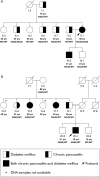Absence of PRSS1 mutations and association of SPINK1 trypsin inhibitor mutations in hereditary and non-hereditary chronic pancreatitis
- PMID: 15082592
- PMCID: PMC1774044
- DOI: 10.1136/gut.2003.026526
Absence of PRSS1 mutations and association of SPINK1 trypsin inhibitor mutations in hereditary and non-hereditary chronic pancreatitis
Abstract
Background and aims: Mutations in the cationic trypsinogen (protease, serine, 1 (trypsin 1); PRSS1) gene are causally associated with recurrent acute and chronic pancreatitis. We investigated whether mutations in the PRSS1 gene are associated with hereditary and non-hereditary pancreatitis. As a modifier role has been proposed for trypsin inhibitor (serine protease inhibitor, Kazal type I; SPINK1) mutations, the role of SPINK1 mutations in these patients was also analysed.
Subjects and methods: The coding regions of PRSS1 and SPINK1 genes were sequenced in 290 controls and 198 patients, of whom 120 were diagnosed as idiopathic (ICP), 41 as alcoholic (ACP), and 37 as hereditary pancreatitis (HP). Twenty four unaffected relatives of HP probands were also analysed and genotype-phenotype correlations and statistical analyses were performed.
Results: No mutations in the PRSS1 gene were detected in any of the patients, including HP patients, while the N34S mutation was observed in the SPINK1 gene in the majority of HP patients (73%). Similarly, 26.8% of ACP (11 of 41) and 32.5% (39 of 120) of ICP patients also had SPINK1 mutations. The N34S mutation was observed in both homozygous and heterozygous conditions. In comparison, only 2.76% of the control population had the N34S allele (p<0.001). The P55S mutation was observed in one ICP and one ACP patient, and in three normal individuals. Genotype-phenotype correlations did not suggest any significant difference in the age of onset, severity of disease, or pancreatic endocrine insufficiency in patients with or without mutated SPINK1 and irrespective of the allelic status of N34S SPINK1.
Conclusions: Irrespective of the aetiology, mutations in the PRSS1 gene are not associated with chronic pancreatitis, including HP. In contrast, the N34S mutation in the SPINK1 gene shows a significant correlation in these patients. A comparable phenotype in terms of age of onset, diabetes mellitus, and other phenotypic features in patients with or without SPINK1 mutations and N34S homozygotes and heterozygotes suggests that there may still be involvement of other genetic or environmental factors.
Figures
Similar articles
-
Mutations in serine protease inhibitor Kazal type 1 are strongly associated with chronic pancreatitis.Gut. 2002 May;50(5):687-92. doi: 10.1136/gut.50.5.687. Gut. 2002. PMID: 11950817 Free PMC article.
-
PRSS1 and SPINK1 mutations in idiopathic chronic and recurrent acute pancreatitis.World J Gastroenterol. 2014 Sep 7;20(33):11788-92. doi: 10.3748/wjg.v20.i33.11788. World J Gastroenterol. 2014. PMID: 25206283 Free PMC article.
-
Tropical calcific pancreatitis: strong association with SPINK1 trypsin inhibitor mutations.Gastroenterology. 2002 Oct;123(4):1020-5. doi: 10.1053/gast.2002.36028. Gastroenterology. 2002. PMID: 12360463
-
Cationic trypsinogen mutations and pancreatitis.Gastroenterol Clin North Am. 2004 Dec;33(4):767-87. doi: 10.1016/j.gtc.2004.07.003. Gastroenterol Clin North Am. 2004. PMID: 15528017 Review.
-
Genetic aspects of chronic pancreatitis: insights into aetiopathogenesis and clinical implications.Swiss Med Wkly. 2001 Oct 6;131(39-40):565-74. Swiss Med Wkly. 2001. PMID: 11775491 Review.
Cited by
-
The prevalence of cationic trypsinogen (PRSS1) and serine protease inhibitor, Kazal type 1 (SPINK1) gene mutations in Polish patients with alcoholic and idiopathic chronic pancreatitis.Dig Dis Sci. 2011 Mar;56(3):894-901. doi: 10.1007/s10620-010-1349-4. Epub 2010 Jul 30. Dig Dis Sci. 2011. PMID: 20676769 Free PMC article.
-
New PRSS1 and common CFTR mutations in a child with acute recurrent pancreatitis, could be considered an "Hereditary" form of pancreatitis ?BMC Gastroenterol. 2010 Oct 15;10:119. doi: 10.1186/1471-230X-10-119. BMC Gastroenterol. 2010. PMID: 20950468 Free PMC article.
-
The Role of Gut Microbiota and Genetic Susceptibility in the Pathogenesis of Pancreatitis.Gut Liver. 2022 Sep 15;16(5):686-696. doi: 10.5009/gnl210362. Epub 2021 Dec 16. Gut Liver. 2022. PMID: 34911043 Free PMC article. Review.
-
Changing phenotype and disease behaviour of chronic pancreatitis in India: evidence for gene-environment interactions.Glob Health Epidemiol Genom. 2016 Oct 18;1:e17. doi: 10.1017/gheg.2016.13. eCollection 2016. Glob Health Epidemiol Genom. 2016. PMID: 29868209 Free PMC article. Review.
-
Protection against chronic pancreatitis and pancreatic fibrosis in mice overexpressing pancreatic secretory trypsin inhibitor.Pancreas. 2010 Jan;39(1):e24-30. doi: 10.1097/MPA.0b013e3181bc45e9. Pancreas. 2010. PMID: 19904222 Free PMC article.
References
-
- Ammann RW. Natural history of chronic pancreatitis. Dig Surg 1994;11:267–74.
-
- Steer ML, Waxman I, Freedman S. Chronic pancreatitis. N Engl J Med 1995;332:1482–90. - PubMed
-
- Etemad B, Whitcomb DC. Chronic pancreatitis:diagnosis, classification, and new genetic developments. Gastroenterology 2001;120:682–707. - PubMed
-
- Ammann RW. A clinically based classification system for alcoholic chronic pancreatitis: summary of an international workshop on chronic pancreatitis. Pancreas 1997;14:215–21. - PubMed
-
- Kloppel G, Luttges J, Lohr M, et al. Autoimmune pancreatitis: Pathological, clinical and immunological features. Pancreas 2003;27:14–19. - PubMed
Publication types
MeSH terms
Substances
LinkOut - more resources
Full Text Sources
Medical
Research Materials
Miscellaneous

